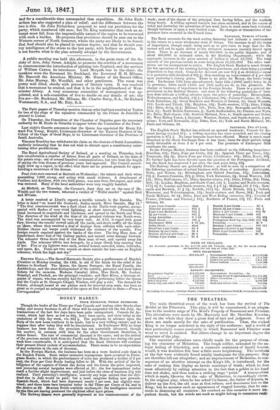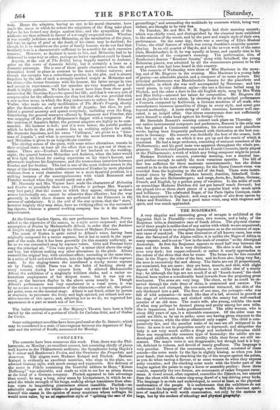THE THEATRES.
The main theatrical event of the week has been the revival of The Bridal, at the Princess's. This play, it will be remembered, is an adapta- tion to the modern stage of The Maids Tragedy of Beaumont and Fletcher. The alterations were made by Mr. Macready arid Mr. Sheridan Knowles; and on the whole they show a great deal of tact and judgment. Some of them are made merely for the sake of purification. Thus, the wicked King is no longer murdered in the sight of the audience; and a world of that particularly coarse comicality in which Beaumont 'and Fletcher were wont to revel is omitted. But others change in an important degree the structure of the play.
The essential alterations seem chiefly made for the purpose of elevat- ing the character of Melantius. The rough soldier, animated by the an- tique feeling of friendship, and a romantic sentiment of family honour, would, it was doubtless felt, bear a little more heighteting. The incidents at the fort were evidently found totally inadequate for this purpose: they are therefore left out altogether; and an imprisonment of Melantius, in con- sequence of an abortive attempt on the King's life, is introduced, for the sake of making him display an heroic contempt of death; which he does most effectively by calling attention to the fact that a goblet in his hand does not shake, and thus makes a striking stage "point" A transposition which is made, likewise for the sake of Melantius, is exceedingly clever. In the original play, when he has asked Callianax, the father of Aspatia, to deliver up the fort, the old man at first refuses, and denounces him to the King; but he assumes such an appearance of rugged honesty, that be 11110- coeds in disarming all suspicion : his conduct on this occasion is mere im- pudent deceit, but his words are such as might belong to conscious read-
tude. Hence the adapters, having an eye to his moral character, have made the scene in which he rebuts the suspicions of the King take place before he has formed any design against him; and the sympathies of the audience are thus enlisted in favour of a wrongly suspected man. Whether it was equally judicious to make Melantins, at the termination of the piece, fall into an agony of grief at the death of his sister, may be doubted; for though he is so sensitive on the point of family honour, we do not find that brotherly love is a characteristic sufficient to be a motive for such excessive remorse. However, as Amintor is made to live, and Melantius had to be distressed in some way or other, perhaps no better expedient could be found. Aspatia, at the end of The Bridal, being happily married to Amintor, gains on the score of domestic felicity, but is certainly a loser as a dramatic personage. She is one of those gentle characters whom the old dramatists loved to place in contrast to the more violent natures; and though she occupies but a subordinate position in the plot, and is almost forgotten by the side of such a strongly-marked couple as Melantius and his sister,—the former ferocious with his honour, the latter savage in vice and savage in repentance,—all her speeches are very beautiful, and her death is highly pathetic. We believe it must have been from sheer good- nature that Mr. Sheridan Knowles spared her life; and that it was as a sort of compensation for the effectiveness she thus lost that she was provided with a new useless scene, in which the King endeavours to seduce her. Edmund Waller, who made an early modification of The Maid's Tragedy shortly after the Restoration, also saved the life of Aspatia; but then, he pub- lished a general amnesty and spared everybody, including even the King. Considering the general massacre effected by Beaumont and Fletcher, this was snapping off the point of Melpomene's dagger with a vengeance. For the omission of Aspatia's father, the present adapters are highly to be com- mended. His humour is dull; and if it were better, the painful position which he holds in the plot renders him an unfitting subject for mirth. His dramatic functions, and his name " Callianax," are given to a " kins- man of Aspatia"; and what is necessary for the scene between the King and Melantius is given to an insignificant courtier. The stirring scenes of the piece, with some minor alterations, remain in their original state; at least all the effect that can be got out of them re- mains. These are—Evadue's defiance of her husband on the wedding- night; the quarrel between Melantius and Amintor, when the latter would at first fight his friend for casting aspersions on his sister's honour, and afterwards implores his forgiveness; and the tremendous interview between Evadne and her brother. This last is one of the most violent scenes in the range of the drama; and the sudden conversion of Evadne by mere physical violence, from a most shameless sinner to a most fanatical penitent, is a striking instance of the unscrupulousness with which Beaumont and Fletcher worked when they would carry out a plot.
Mr. Macready and Mrs. Warner have made the characters of Melantius and Evadne so peculiarly their own, (Evadne is perhaps Mrs. Warner's very best part,) that the scenes in which they appear, stirring as those scenes intrinsically are, cannot be otherwise than effective: but the way generally in which these dramas are performed at the Princess's is the reverse of satisfactory. It is the evil of the star system, that the " stars," however brightly they may shine, have no vivifying effect on the surround- ing objects; whereas a general working company has in it the seeds of improvement.



























 Previous page
Previous page